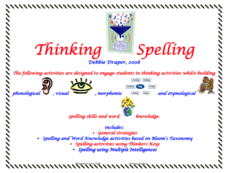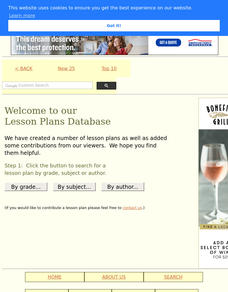Curated OER
Appreciating the Language and Interpreting the Meaning of Hamlet's Soliloquy
Students analyze Hamlet's soliloquy, "To be or not to be." In this Hamlet lesson, students define unfamiliar words in the soliloquy and interpret the lines. Students then read the lines aloud and identify descriptive words....
Curated OER
Thinking Spelling
An etymology resource is packed with suggestions for activities designed to build phonological, visual, morphemic, and etymological spelling skills.
Worksheet Web
Heteronyms
Challenge scholars to identify and use heteronyms in a sentence with a two-page worksheet designed to boost grammar skills.
Book Units Teacher
Skill Lessons – Prefixes and Suffixes
Sometimes the best way to understand a concept is to break it down. Young vocabulary pupils work with word parts in a hands-on activity that prompts them to connect flash cards with affixes to their root and base words....
Scholastic
Dr. Seuss Extension Activities
Extend the exhilarating learning experience of Dr. Seuss with five activities designed to reinforce literacy skills—site word reading, dialogue writing, story mapping, and more! Featured stories include The Lorax,...
August House
The Magic Pot
The Magic Pot by Patricia Coombs is the theme of this multidisciplinary lesson plan. Early readers first take part in a read aloud and grand conversation about the story's details. Then, they get to work practicing their skills in...
Curated OER
Practice Book O
Whether you need resources for reading comprehension, literary analysis, phonics, vocabulary, or text features, an extensive packet of worksheets is sure to fit your needs. Based on a fifth-grade curriculum but applicable to any level of...
K5 Learning
The Three Billy Goats Gruff
Guide kids as they trip trap over their bridge of reading with an activity focused on The Three Billy Goats Gruff. First graders read the classic story before answering a few reading comprehension questions about the events and...
Curated OER
What is Language?
Intended to be used along with the first chapter of An Introduction to Language textbook, this PowerPoint is full of linguistic terminology that is not necessarily explained. This tool can be used to complement a lecture or a text, but...
Curated OER
Commonly Confused Words - Quiz 16
These words are very confusing for non-native English speakers because they sound very similar, but they have different meanings. Quiz your English language learners on their knowledge of various homophones with this 20-question quiz.
Curated OER
Usage Errors
Look at the most commonly confused words in the English language! This resource briefly explains the difference between there, they're, and their as well as too, to, and two, and finally it's and its. First, read the section...
University of North Carolina
Curricula Vitae (CVs) versus Resumes
The term curricula vitae might sound more sophisticated than the term resumes, but that doesn't mean it's the preferred document to send to potential employers. As explained in a handout on curricula vitae (CV) versus resumes, part of a...
DK Publishing
Sentences #2 Worksheet
As your scholars learn how to read, it's important they understand that sentences are made up of words. For this visual worksheet, they count the words in two simple sentences and record the numbers. Each five-word sentence also has a...
Paul Hudson
SPQR Latin Dictionary and Reader
Searching for an incredibly thorough Latin app? Look no further! Latin learners will be quite satisfied with the collection of texts, three dictionaries, customizable flashcards, assessment options, and other features that are right at...
Curated OER
Worksheet 6: Chief Seattle: Definitions
In this definitions worksheet, students read 18 sentences that each refer to a line in Chief Seattle's speech. This speech is not included here. Students find a word that means the same as the word in bold in each sentence.
Curated OER
Timbre II
In this music worksheet, students learn that timbre, or tone color, means different kinds of sounds. Students complete 10 questions about timbre and general music topics.
Curated OER
Sizzling Sausage
Students explore the sounds of the alphabet. They practice making the /s/ sound. Students repeat tongue twisters. They write words with the /s/ sound. Students read a book about sounds and their spellings.
Curated OER
School-Home Links: Correct Words in Context
In this word usage activity, learners read several word pairs of words that sound and are spelled similarly. Students then place the correct word to complete the sentence. Parents or guardians must sign the activity.
Curated OER
Do You Hear That Crying Baby?
Learners study the short /a/ sound by examining the movement of their mouths as they make the sound mimicking a baby's cry. They recite a tongue twister and write the lower case "a." They raise their hands when they hear the letter sound...
Curated OER
Add Awesome Alliteration to your Writing
Young scholars practice writing with alliteration, repeating the same letter sound at the beginning of two or more words in a sentence; students also review of adjectives, verbs, and adverbs while creating an alphabet book.
Curated OER
Measures of Central Tendency
Students analyze data using central tendencies. In this statistics lesson, students collect and analyze data using the mean, median and mode. They create a power point representing the different measures of central tendency.
Curated OER
Riddles Rule
Fourth graders examine words with multiple meanings. In this homonym lesson plan, 4th graders identify words that sound the same and define their meanings. Students create riddles using the homonyms they have learned.
Curated OER
Polar Bear Literacy Activity
Students generate vocabulary words synonymous or related to "noise." In this literacy instructional activity, students listen to the book Polar Bear, Polar Bear, What do You Hear? by Bill Martin and Eric Carle and discuss the meaning of...
Curated OER
Comparing Data
Eighth graders create a survey, gather data and describe the data using measures of central tendency (mean, median and mode) and spread (range, quartiles, and interquartile range). Students use these measures to interpret, compare and...























